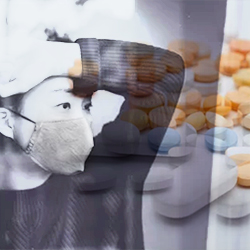By David Wild
Originally published by our sister publication, Pharmacy Practice News
The number of new COVID-19 cases has subsided recently, but the pandemic’s effects on mental health and substance use disorders (SUDs) continue, an expert said at the 2021 annual meeting of the American College of Clinical Pharmacy.

On Oct. 19, 2021, a national emergency in children’s mental health was declared, with professional organizations urging policymakers to take swift action to address the crisis in this younger population.
“Anyone who has cared for children is very aware of how life has gotten disrupted during the pandemic, and of the mental health implications of that,” Jeffrey Bratberg, PharmD, a clinical professor of pharmacy practice at the University of Rhode Island College of Pharmacy, in Kingston, told meeting attendees.
The children’s mental health emergency declaration, issued by the American Academy of Pediatrics, American Academy of Child and Adolescent Psychiatry and Children’s Hospital Association, noted that 140,000 children lost a caregiver during the pandemic, and these were disproportionately children of color. Additionally, rates of depression, anxiety, trauma and loneliness have “skyrocketed,” Dr. Bratberg said, and emergency department visits for suspected suicide attempts increased 51% among girls 12 to 17 years of age in early 2021, compared with early 2019.
Intimately linked to the mental health of children is that of adults who provide care for those children, Dr. Bratberg added, pointing to the results of a CDC report (MMWR Morb Mortal Wkly Rep 2021;70:879-887). This report analyzed data between December 2020 and March 2021 from more than 10,000 adults, and found parents, unpaid caregivers of adults and those in dual parent/adult caregiver positions had a five-fold increased risk for an adverse mental health symptom compared with individuals not in those categories. Specifically, 70% of parents or caregivers reported mental health symptoms during the pandemic, including 55% who had anxiety or depression, 54% with COVID-19?related trauma and 32% who experienced serious suicidal thoughts.
“We have to think about both parents and children and of the amazing benefits of keeping children in school as long as they have deployed COVID-19 mitigation strategies,” Dr. Bratberg said.
People with a history of undiagnosed mental health challenges or substance misuse have seen their conditions exacerbated during the pandemic, said Dr. Bratberg, who has a research focus on substance use and has served on the Rhode Island Governor’s Overdose Prevention and Intervention Task Force.
He noted that such individuals have presented with more severe challenges during the pandemic than they might have previously. “So, instead of going from problematic substance use to substance misuse at the time of diagnosis, they’re now jumping right to a diagnosis of substance use disorder or a mental health disorder,” he said.
There are several ways the pandemic has been a stressor for people at risk for mental illness and SUDs, from constant exposure to negative news to the effects of mitigation measures such as mask wearing and social isolation, according to Dr. Bratberg. Although these interventions help to slow transmission of the SARS-CoV-2 virus, “they can cause mental strain and lead to significant morbidity and mortality,” he said.
“One harm reduction strategy that we use in the treatment of SUDs is to tell people who use drugs to use together, but if you’re afraid of COVID-19, you won’t do that.”
—Dr. Bratberg reported no relevant financial disclosures.

